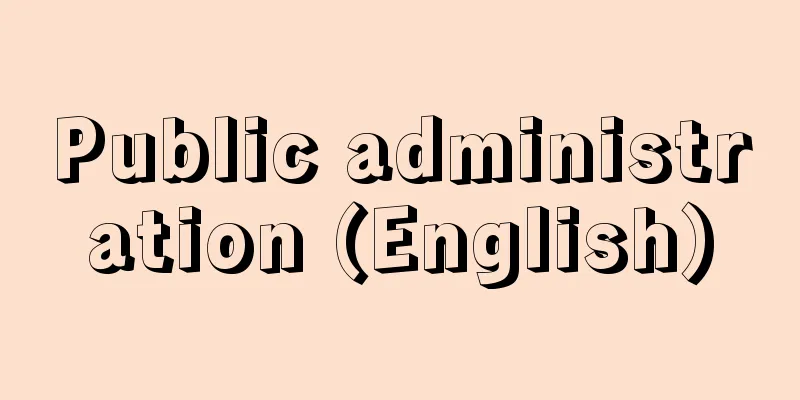Public administration (English)

|
If we assume that administration is a translation of the English term public administration, it literally means the processing or management of public tasks and affairs. Public tasks are tasks and affairs that relate to all or a greater number of members of society and are carried out at public expense, and processing or management includes the implementation of public tasks and management in the narrow sense. Implementation is the group of activities that actually carry out the tasks, while management in the narrow sense is the group of activities that make their execution smoother, unified, and coordinated. It can be said to be the process of preparing the conditions necessary for implementation. One commentator includes the following ten activities (or activities (2) to (9) excluding (1)) in the narrow sense of management here: (1) secondary policy decision-making (complementary to decision-making regarding the purpose and content of tasks), (2) planning, (3) organizational management, (4) personnel management, (5) budget management, (6) material management, (7) command, (8) communication, (9) coordination, and (10) control (Teshima Takashi). If we define the social phenomenon of administration in this way, it can be understood that it is closely related to politics, which is the primary policy decision-making regarding public issues (basic decisions related to the purpose and content of public affairs), and at the same time, insofar as it concerns the implementation and management of affairs (in the narrow sense), it also has a certain degree of technical commonality with businesses and other private administrations. Now, according to the abstract general concept of administration as defined here, administration probably began with the formation of human society and will likely continue into the future, and the concrete forms it takes have varied, both historically and spatially, and may vary as well. Marxists argue that in primitive communist society and in the future communist society, the public/common affairs of society are carried out and managed by all members of society or by its genuine public servants, but that in a class society with a state, a special power mechanism of class rule, the government, which stands above the members of society and has its own special interests, will tend to determine the purpose and content of public affairs and also monopolize their management, and that the substance of the work defined by the government as "public service" will be divided into (1) that which is solely related to the special interests of the ruling class but is considered "public service," and (2) that which is not directly linked to the interests of the ruling class but is related to the maintenance and survival of the society in question, and that the former will be superior to the latter, and the latter will be subordinate to and distorted by the former, and will be carried out with class consequences. [Taguchi Fukuji] Administration of modern states and administration of contemporary statesIn modern capitalist countries from the end of the 18th century to the 19th century, when they had undergone the civil revolution or when "bourgeoisization from above" was progressing, the separation of powers between the legislative, executive, and judicial branches was almost uniformly one of the principles for organizing the governing body, and while state administrative activities differed from country to country -- the more economically backward or least developed a country was, the stronger the administrative branch was due to the need to promote capitalism from above, and the more active its intervention in the economy and society was (Japan after the Meiji Restoration is a typical example, which was described as a "born administrative state" and was characterized by the fact that public administration was first understood as "execution" and then as "administration" = carrying out politics), in economically advanced countries, civil society was highly autonomous and state intervention was kept to a minimum -- but generally it remained passive. This led to a definition (the deduction theory) that states "all state activities that are neither judicial nor legislative are called administrative" and also gave rise to a school of thought that sees administration as a function of law and only cares about its legal conformity (the extreme theorization of this is the view of pure jurisprudence, which sees administration as a legal action that individualizes general legal norms). However, at the beginning of the 20th century, for various reasons, the administrative functions of the state, especially its economic and social functions, expanded, and this led to a tendency for the executive or administrative power within the governing body (which, strictly speaking, consists of the political executive branch, such as the cabinet and the president, at the top, and the administrative organization under its control, the bureaucracy) to gain dominance (the rise of the administrative state). Furthermore, after World War II, the intervention of modern states in the social and economic processes became comprehensive, permanent, and structural, and the administration of capitalist states in particular became the most important means for capital accumulation and system stabilization (maintenance of social harmony) (the establishment of state interventionism or an interventionist state). Reflecting this situation, in recent years, for example in the field of administrative law, a theory has emerged that defines administration as the "direct and concrete realization of national objectives (or public interest)." In any case, the characteristics of modern administration can be found in: (1) the expansion and change of national space due to the expansion of economic space, and the structural and functional expansion and complexity of national administrative organizations, i.e., the public sector; (2) the reorganization of national administrative functions with the economic function at their core and the diversification of intervention methods (especially in addition to traditional regulations, the increasing weight of induced methods such as planning, contracting, and public fund intervention, as well as direct management methods such as public enterprises); and (3) the expansion of executive power, especially the political role of the bureaucracy, and the growing rifts and conflicts between administrative departments that have ``symbiotic'' relationships with the interest groups that are their clients, reflecting the contradictions in society. [Taguchi Fukuji] "Reflections on the Concept of Administration" by Takashi Teshima (1982, Gakuyo Shobo) " "Outline of Public Administration" by Fukuji Taguchi (1981, Yuhikaku)" "Introduction to Public Administration, Volume 1" by Kiyoaki Tsuji (1966, University of Tokyo Press) Source: Shogakukan Encyclopedia Nipponica About Encyclopedia Nipponica Information | Legend |
|
行政を英語のpublic administrationの訳語と想定すると、それは文字どおりには公共的仕事・事務の処理ないし管理を意味する。公共的事務とは、社会の全成員ないし多少とも多数の成員に関連し、公的費用負担において遂行される仕事・事務であり、処理ないし管理には、公共事務の実施および狭義の管理が含まれる。実施とは事務を実際に履行する活動群であり、狭義の管理とは、それらの執行をより円滑にし統一化し調整する活動群である。実施に必要な諸条件を準備する過程といってもよい。ある論者は、ここでいう狭義の管理に以下の10の活動(ないし、(1)を除く(2)~(9)の活動)を含ませている。すなわち、(1)二次的政策決定(事務の目的・内容に関する意思決定の補完)、(2)企画、(3)組織管理、(4)人事管理、(5)予算管理、(6)物品管理、(7)指揮、(8)伝達、(9)調整、(10)管制(コントロール)、である(手島孝(たかし))。行政という社会現象をこのように規定すると、それが公共問題について第一次的政策決定(公共事務の目的・内容にかかわる基本的決定)である政治と密接な連関を有すると同時に、事務の実施と管理(狭義)である限りにおいて、企業その他の私経営private administrationとも一定の技術的共通性をもつことが理解されよう。 さて、ここで定義したような抽象的一般的行政概念に従えば、行政はおそらく人類社会の形成とともに始まり将来的に存続するであろうし、それがとる具体的形態も歴史的、空間的にさまざまであったし、さまざまでありうるであろう。マルクス主義者は、原始共産主義社会や将来の共産主義社会においては、社会の公共=共同事務は、社会成員全体によってか、その真正の公僕によって実施・管理されるが、国家を伴う階級社会においては、社会成員のうえにたち、それ自体の特殊利害をもつ、階級支配の特殊な権力機構=政府が、公共事務の目的・内容を決定すると同時にその管理をも独占しがちになり、かつ政府によって「公務」と規定される仕事の内実も、(1)もっぱら支配階級の特殊利益にかかわるものでありながら「公務」とされたものと、(2)直接的には支配階級の利害には結び付かない当該社会の維持・存続にかかわるものとに分裂し、しかも前者が後者に優越し、後者は前者に従属して歪曲(わいきょく)され、階級的帰結を伴って遂行される、と説いている。 [田口富久治] 近代国家の行政と現代国家の行政市民革命を経たか「上からのブルジョア化」が進行した18世紀末から19世紀にかけての近代資本主義国家においては、ほぼ一様に、立法・行政・司法の三権分立が統治機構編成の一原則とされ、かつ国家の行政活動も国によって相異があるが――経済的後進国・後発国ほど上からの資本主義化を促進する必要から行政部が強大で、その経済・社会への介入活動が積極的であり(明治維新後の日本もその一典型で、それは「生まれながらの行政国家」と評され、public administrationは、初め「行法」、ついで「行政」=政治を行うこととして理解されたのが特徴的である)、経済的先進国では市民社会の自律性が強く、国家介入は最小限にとどめられた――、一般的には消極的なものにとどまった。ここから「司法でも立法でもない国家活動のすべてを行政という」類の定義(控除説)がとられ、また行政を法の関数とみ、行政の法的適合性のみを問題とする学派も現れた(その極限的理論化が純粋法学の、行政を一般的法規範を個別化する法的作用とみなす見解である)。 しかし20世紀に入るころになると、さまざまな理由から、国家の行政機能、とくに経済的・社会的機能が拡大し、それに伴って統治機構内での執行権ないし行政権(それは厳密にはその頂点としての内閣・大統領などの政治的執行部とその統轄下の行政組織=官僚制からなる)の優位の傾向が現れる(行政国家の台頭)。さらに第二次世界大戦後になると、現代国家の社会・経済過程への介入は全面的、恒久的、構造的なものとなり、とくに資本主義国家の行政は、資本蓄積と体制安定化(社会的調和の維持)のためのもっとも重要な手段となっている(国家介入主義ないし介入主義国家の成立)。そしてこのような情勢を反映して近時、たとえば行政法学の領域において、行政を「国家目的(あるいは公益)の直接的・具体的実現」と定義する学説も現れている。いずれにしろ、現代行政の特徴は、(1)経済空間の拡大に伴う国家空間の拡大・変化と国家行政機構=公共部門の機構的・機能的膨大化と複雑化、(2)国家行政機能の経済的機能を中軸とする再編成化と介入手段の多様化(とくに伝統的な規制などに加えて、計画化、契約化、公的資金介入などの誘導方式および公企業などの直接管理方式の比重の増大)、(3)執行権、とくに官僚制の政治的役割の増大と社会の矛盾を反映し、それぞれの行政顧客たる利益集団と「共生」関係を取り結ぶ行政諸部門間の亀裂(きれつ)や紛争の拡大などに求められよう。 [田口富久治] 『手島孝著『行政概念の省察』(1982・学陽書房)』▽『田口富久治著『行政学要論』(1981・有斐閣)』▽『辻清明著『行政学概論 上巻』(1966・東京大学出版会)』 出典 小学館 日本大百科全書(ニッポニカ)日本大百科全書(ニッポニカ)について 情報 | 凡例 |
<<: Administrative Committee - Gyoseiinkai
Recommend
Pickaxe
〘Noun〙 (also "Tsurubashi") A tool used t...
San Francisco Bay - San Francisco Bay
A bay in central California, USA. It is 80 km long...
Ten virtues - Jittoku
A type of clothing for men. It is a corrupted ver...
Alkaline series
⇒Alkaline rock Source: Asakura Publishing Dictiona...
Re-election - Saisenkyo
〘 noun 〙 To hold a second election. To hold an ele...
Shimoda [Hot Springs] - Shimoda
A national health resort hot spring in Amakusa Cit...
Tanabe Fukumaro - Tanabe no Sakimaro
Years of birth: unknown. A poet of the Nara period...
Ansar (English spelling)
...A wide range of people participated in the reb...
Indus [river] - Indus
One of the three major rivers in the Indian subcon...
lesser grain borer
...The lesser grain borer, Rhizopertha dominica ,...
Bloodline - Ketsumyaku
〘Noun〙① Tubes through which blood flows in the bod...
Lead carbonate
The basic salt 2PbCO3.Pb (OH) 2 is known commerci...
Les Provinciales (English)
A collection of letters by Pascal. He wrote and pu...
Horyu-ji Temple
The head temple of the Shotoku sect, located in I...
Regular deposit - Futsuuyokin (English spelling) ordinary deposit
This is a typical demand deposit with high liquid...









